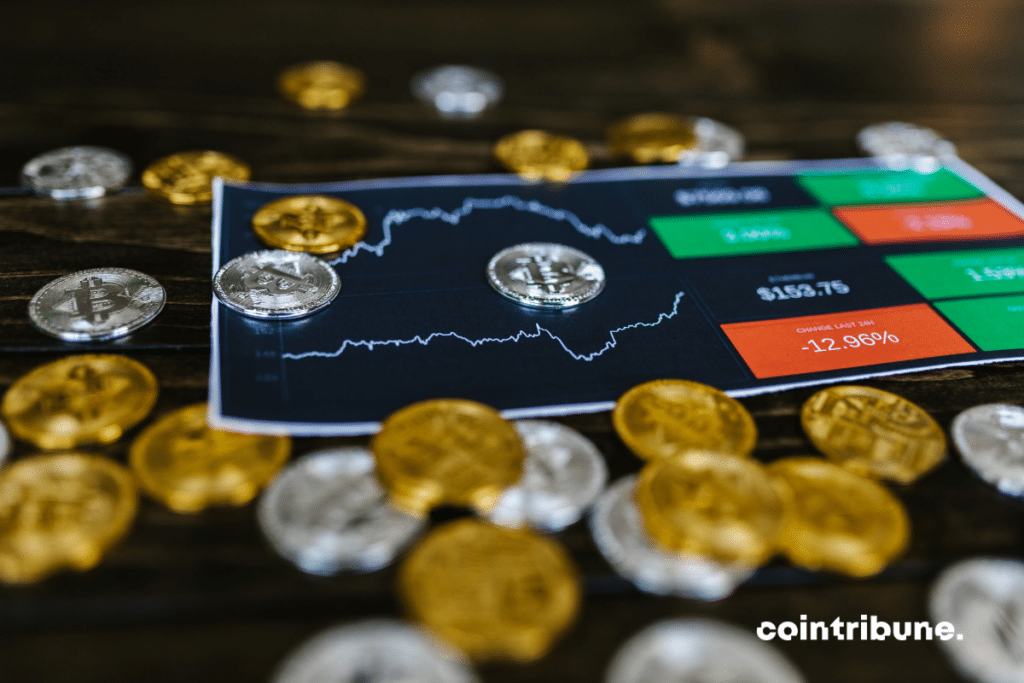Investing in altcoins, is it a good idea?
Investing in altcoins is a trend gaining popularity in the world of cryptocurrencies. These digital currencies offer unique and diversified prospects for investors. However, investing in altcoins comes with its own set of challenges, particularly in terms of market volatility, security risks, and regulatory complexities. Faced with these issues, investors often wonder if trading altcoins is a wise decision. This article explores the advantages, investment processes, associated risks, and ultimately evaluates the relevance of investing in altcoins.

Why invest in altcoins?
Altcoins, these alternative currencies to bitcoin, have gained considerable traction in the cryptocurrency space. Here are specific reasons that make these cryptocurrencies attractive for investment.
Diversification and growth potential
Altcoins offer a unique opportunity for diversification for cryptocurrency investors. Unlike bitcoin, often seen as a store of value, many altcoins, such as ether, Ripple‘s XRP, or litecoin, are developed with specific objectives and use cases. This diversity allows investors to spread their risks across different types of projects and blockchain technologies. Moreover, the growth potential of some altcoins is significant. Innovative and promising projects can see their value increase rapidly, offering potentially high returns. However, it is important to note that this potential comes with high volatility and increased risk.
Technological innovation and utility
Altcoins are often at the forefront of innovation in the blockchain space. For example, Ethereum introduced the concept of smart contracts, fundamentally changing how decentralized applications can be built and used. Other altcoins focus on scalability solutions, decentralized finance (DeFi) applications, or even projects related to the Internet of Things. Investing in altcoins allows one to support and participate in these technological innovations. For investors, this means not only financial gain potential but also the opportunity to contribute to projects that could shape the future of blockchain technology and its applications.
Accessibility and expanding market
Altcoins are generally more accessible than bitcoin, with often lower unit prices. This accessibility allows investors of all levels, including those with a limited budget, to participate in the cryptocurrency market. Additionally, the altcoin market is constantly expanding, with new projects and tokens launched regularly. This provides investors with a multitude of options and the opportunity to discover nascent and promising projects. However, this rapid expansion also implies that investors must remain vigilant and informed, as not all altcoin projects are viable or reliable in the long term.
Investment strategies in altcoins
Investing in altcoins requires a strategic approach to maximize gains while minimizing risks. Let’s take a closer look at key strategies for effectively investing in these cryptocurrencies.
Fundamental analysis of altcoin projects
Fundamental analysis is crucial when investing in altcoins. This approach involves a thorough evaluation of the project behind each altcoin, including its objective, technology, development team, and market potential. For example, an investor might examine Ethereum for its pioneering role in smart contracts and decentralized applications, or Binance Coin for its use in the Binance crypto exchange ecosystem. Fundamental analysis helps identify altcoins with long-term growth potential by focusing on their intrinsic value rather than short-term price fluctuations. This also involves tracking project developments and updates, as well as broader cryptocurrency market trends.
Diversification and risk management strategies
Diversification is a key strategy in altcoin investment. Instead of focusing on a single altcoin, investors can spread their investment across multiple currencies, thereby reducing overall risk. This approach may include a mix of established tokens like ether and newer, promising projects. Risk management is also important. This involves not investing more than one can afford to lose and using strategies such as profit-taking and setting loss limits to protect investments. Investors must also be aware of the inherent volatility in the altcoin market and be prepared to adjust their strategy based on market changes.
Long-term vs. short-term trading
Altcoin investors must choose between a long-term investment strategy and short-term trading. A long-term approach involves holding altcoins over an extended period, hoping that their value will increase significantly over time. This strategy is often adopted by those who believe in blockchain technology and the potential of altcoin projects. On the other hand, short-term trading involves buying and selling altcoins over shorter periods, capitalizing on market volatility to achieve quick gains. Although potentially more profitable, this approach requires a deep understanding of market trends and constant availability to react quickly to market changes.

Investing in altcoins: step-by-step process
Investing in altcoins may seem complex for newcomers to the cryptocurrency world. However, by proceeding methodically, investors can successfully navigate this dynamic market. Here is the procedure for investing in altcoins.
Research and selection of altcoins
The first crucial step in altcoin investment is researching and selecting currencies. This involves studying various altcoins and their underlying projects to understand their potential. Investors must examine aspects such as the blockchain technology used, the altcoin project’s objective, the strength and experience of the development team, and the community support around the altcoin. For example, Ethereum, known for its smart contracts, offers a different use case from Binance Coin, which is integrated into the Binance exchange ecosystem. This step also requires following news and market analysis to identify promising altcoins and understand current cryptocurrency market trends.
Choosing a trading platform and purchasing altcoins
Once the research is done and altcoins are selected, the next step is to choose a reliable trading platform to conduct transactions. Platforms like Binance, Coinbase, or Kraken offer a wide range of altcoins and are known for their security and user-friendliness. Investors need to create an account, complete necessary verifications, and deposit funds, usually in the form of fiat currency or bitcoin. Altcoin purchases are then made by placing buy orders on the trading platform. It is important to understand the different types of orders, such as market orders or limit orders, and monitor price fluctuations to buy at an optimal price.
Management and monitoring of investment
After purchasing altcoins, managing and monitoring the investment is important. This involves regularly monitoring the performance of your altcoins and staying informed about developments in the cryptocurrency sector. Investors must be prepared to adjust their portfolio based on market changes, whether by selling some altcoins or buying others. Risk management is also crucial, meaning not putting all eggs in one basket and being ready to cut losses if necessary. Additionally, securing investments is paramount. This may involve transferring altcoins off trading platforms to private wallets, such as hardware wallets or software wallets, for increased security.
Risks associated with investing in altcoins
Investing in altcoins, while potentially profitable, comes with significant risks. Investors must be aware of these risks to make informed decisions. Let’s take a closer look at the main risks associated with investing in altcoins and how to manage them effectively.
Volatility and price fluctuations
Volatility is one of the most obvious risks in altcoin investment. Unlike traditional currencies or other forms of investment, altcoin prices can experience extreme fluctuations in a short amount of time. Factors such as regulatory announcements, technological developments, or even market trends and sentiments can lead to significant price movements. For example, a tweet from an influential figure in the cryptocurrency world can cause a sudden price spike or drop. This volatility can be a double-edged sword: it offers opportunities for quick gains but also exposes investors to potentially significant losses. Implementing stop-loss strategies and diversifying the portfolio are practical solutions to mitigate this risk.
Security risks and fraud
Security risks are a major concern in altcoin investment. Cryptocurrency trading platforms, while constantly improving their security measures, remain targets for hackers. Hacking incidents have resulted in significant fund losses for investors. Additionally, the altcoin market is not immune to scams and fraud. Altcoin projects may be launched with grand promises but little substance behind them. To protect themselves, investors must conduct thorough research on altcoins and trading platforms, use secure wallets to store their cryptocurrencies, and remain vigilant against offers that seem too good to be true.
Lack of regulation and legal uncertainty
The altcoin market operates in a regulatory environment that is still evolving. This lack of clear regulation can lead to legal uncertainty for investors. For example, an altcoin may be considered a security in one country but not in another, affecting how it can be legally bought, sold, or traded. Additionally, government policies regarding cryptocurrencies are likely to change, which can have a significant impact on the market. Investors must therefore stay informed about regulatory developments in different countries and be prepared to adjust their investment strategies accordingly. It is also advisable to consult with experts to understand the legal implications of their investments.
Investing in altcoins: Is it ultimately a good idea?
Investing in altcoins is a decision that must be made with caution. Altcoins like ether, litecoin, or Ripple’s XRP offer promising technological innovations, particularly in areas such as smart contracts and payment solutions. These innovations suggest significant growth potential, attracting the interest of savvy investors. However, the altcoin market is marked by high volatility, with price fluctuations occurring rapidly in response to factors such as regulatory changes or market trends. Additionally, security risks and scams are important considerations, requiring constant vigilance. While altcoins may offer attractive investment opportunities with high return potential, they also come with significant risks. Therefore, investors must conduct thorough research, fully understand the risks involved, and consider a diversification strategy to minimize potential losses.
Conclusion
Investing in altcoins can be complex but is also potentially lucrative in the cryptocurrency space. While these assets offer opportunities for innovation and growth, they come with notable risks, particularly in terms of volatility and security. Therefore, investors must proceed with diligence, armed with in-depth knowledge of each altcoin and staying updated with market trends. A cautious approach and diversification strategy are necessary for success. In summary, altcoins can be a rewarding addition to an investment portfolio, provided the investor is well-informed and aware of the inherent risks.
Maximize your Cointribune experience with our "Read to Earn" program! For every article you read, earn points and access exclusive rewards. Sign up now and start earning benefits.
The Cointribune editorial team unites its voices to address topics related to cryptocurrencies, investment, the metaverse, and NFTs, while striving to answer your questions as best as possible.
The views, thoughts, and opinions expressed in this article belong solely to the author, and should not be taken as investment advice. Do your own research before taking any investment decisions.